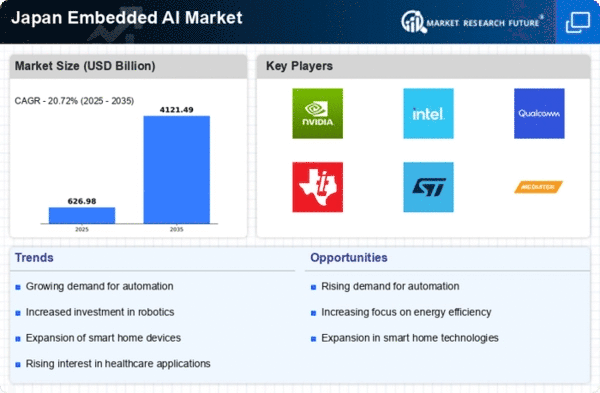Growth in Automotive Sector
The automotive sector in Japan is undergoing a transformation, with a strong emphasis on integrating AI technologies into vehicles. The embedded ai market is poised to benefit from this trend, as the demand for advanced driver-assistance systems (ADAS) and autonomous driving capabilities continues to rise. By 2025, the market for AI in automotive applications is projected to reach approximately $5 billion, reflecting a compound annual growth rate (CAGR) of around 15%. This growth is fueled by consumer expectations for enhanced safety features and improved driving experiences. The embedded ai market is thus becoming increasingly critical in developing these technologies, as automakers seek to leverage AI for real-time data analysis and decision-making. Consequently, the embedded ai market is likely to see increased collaboration with automotive manufacturers, leading to innovative solutions and products.
Expansion of AI in Healthcare
The healthcare sector in Japan is increasingly adopting AI technologies, which presents a significant opportunity for the embedded ai market. With an aging population and rising healthcare costs, there is a pressing need for innovative solutions that enhance patient care and operational efficiency. The embedded ai market is expected to play a crucial role in this transformation, as AI-driven applications for diagnostics, patient monitoring, and personalized medicine gain traction. By 2025, the market for AI in healthcare is anticipated to reach approximately $3 billion, indicating a strong growth potential. This expansion is likely to be supported by advancements in machine learning and data analytics, which enable healthcare providers to make more informed decisions. As a result, the embedded ai market is positioned to capitalize on these trends, driving further innovation and investment in healthcare applications.
Rising Demand for Smart Devices
The embedded ai market in Japan is experiencing a notable surge in demand for smart devices, driven by consumer preferences for enhanced functionality and automation. As of 2025, the market for smart home devices is projected to reach approximately $10 billion, indicating a robust growth trajectory. This trend is largely attributed to the increasing integration of artificial intelligence in everyday appliances, which enhances user experience and operational efficiency. The embedded ai market is thus positioned to benefit from this consumer shift, as manufacturers seek to incorporate advanced AI capabilities into their products. Furthermore, the proliferation of IoT devices is expected to further stimulate demand, as these devices increasingly rely on embedded AI for real-time data processing and decision-making. Consequently, the embedded ai market is likely to see significant investment and innovation in the coming years.
Government Initiatives and Support
The Japanese government is actively promoting the adoption of AI technologies across various sectors, which significantly impacts the embedded ai market. Initiatives such as the 'AI Strategy 2025' aim to position Japan as a leader in AI innovation. This strategy includes substantial funding and support for research and development, which is expected to exceed $1 billion by 2025. Such government backing not only fosters innovation but also encourages collaboration between public and private sectors, enhancing the overall ecosystem for the embedded ai market. Additionally, regulatory frameworks are being established to facilitate the safe and ethical use of AI technologies, which could further bolster market growth. As a result, the embedded ai market is likely to experience accelerated advancements and increased adoption rates, driven by these supportive governmental policies.
Increased Focus on Energy Efficiency
As Japan continues to prioritize sustainability and energy efficiency, the embedded ai market is likely to see increased demand for AI-driven solutions that optimize energy consumption. The government has set ambitious targets for reducing greenhouse gas emissions, which could lead to a market expansion for energy-efficient technologies. By 2025, the market for AI applications in energy management is projected to reach around $2 billion, reflecting a growing awareness of environmental issues. The embedded ai market is expected to contribute significantly to this effort by providing intelligent systems that monitor and manage energy usage in real-time. This focus on sustainability not only aligns with governmental policies but also resonates with consumers who are increasingly environmentally conscious. Consequently, the embedded ai market is well-positioned to thrive in this evolving landscape.
















